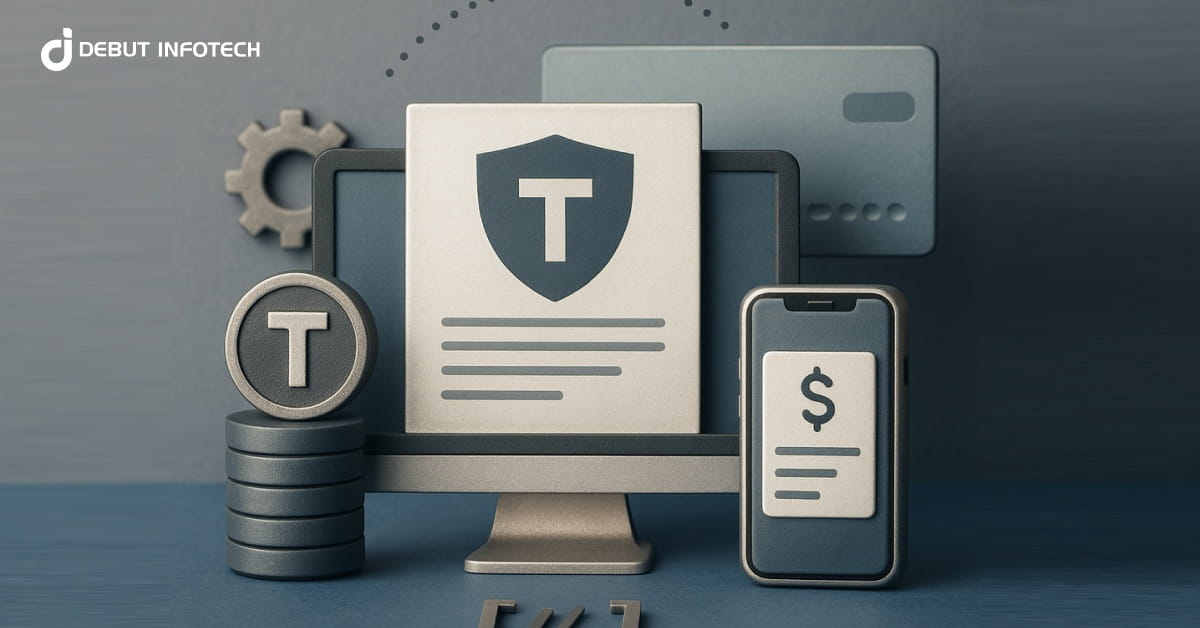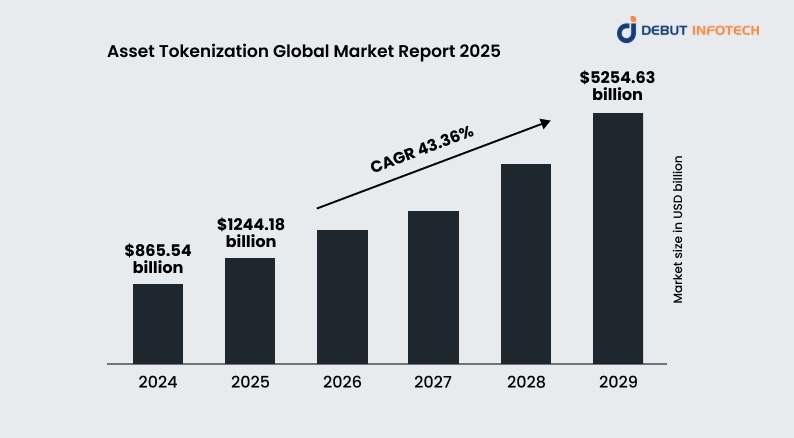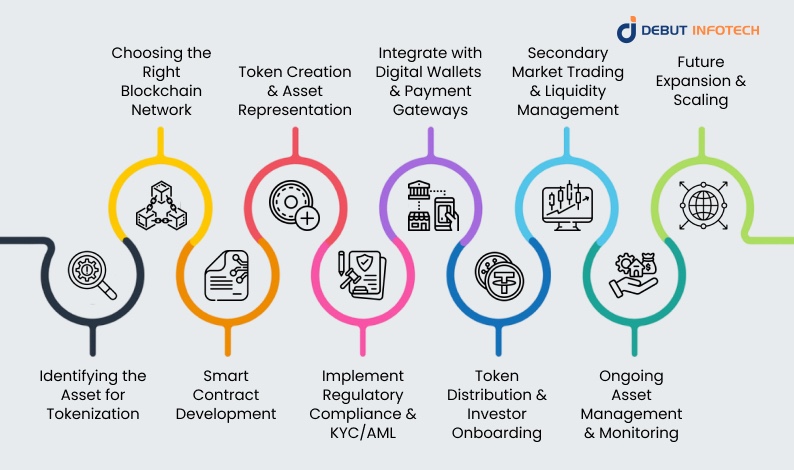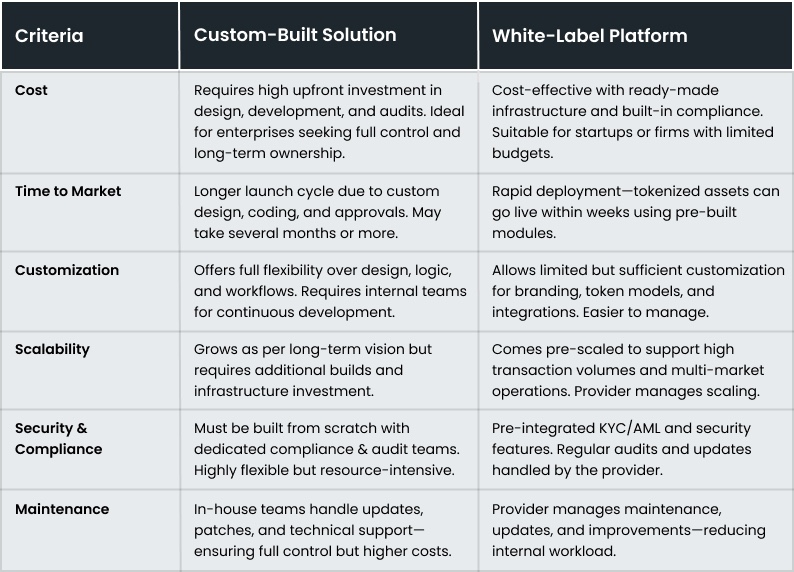Table of Contents
Home / Blog / Tokenization
Step-By-Step Process of Launching a White Label Tokenization Platform
October 8, 2025

October 8, 2025
A white label tokenization platform empowers businesses to convert real-world assets—such as real estate, equities, commodities, and NFTs—into secure, tradable digital tokens. These solutions dramatically reduce time-to-market and development costs while offering scalability, compliance, and brand control.
For instance, the value of tokenized assets, spanning real estate, private credit, and Treasuries, is projected to hit $412 billion by early 2025, based on data from both public blockchains and permissioned platforms. In addition, the real-world asset (RWA) tokenization market has already surged to \$24 billion in 2025, marking a 308% increase in just three years.

As organizations seek liquidity, transparency, and innovation, white label platforms are emerging as the cornerstone of modern digital asset strategies. In this guide, we will define a white label asset tokenization platform, why it is crucial to businesses, a step-by-step implementation guide, use cases and future outlook.
Save Time, Cut Costs with our White label solution
Why build from scratch? Leverage our white label solution and reduce development costs while hitting the market faster.
What is a White Label Tokenization Platform?
A white label tokenization platform is a pre-built, customizable solution that enables businesses to create and manage digital tokens representing assets such as real estate, stocks, or commodities.
Unlike developing a system from scratch, a white label real world asset tokenization platform offers ready infrastructure with flexible branding options, regulatory compliance, and scalability, allowing organizations to launch tokenized products efficiently.
Benefits of White Label Tokenization Platforms for Businesses
1. Faster Time-to-Market
White label tokenization platforms allow businesses to bypass long development cycles by offering pre-built, ready-to-deploy solutions. This rapid launch capability ensures companies can introduce tokenized assets quickly, capture early market opportunities, and meet investor demand without delays or the risk of technological setbacks.
2. Reduced Costs
Developing a tokenization system from scratch requires significant technology, compliance, and infrastructure investment. White label platforms minimise these expenses by delivering enterprise-grade solutions at a fraction of the cost, allowing businesses to allocate more resources to growth, operations, and investor relations while maintaining high performance.
3. Focus on Core Business
With technical complexities, compliance checks, and blockchain integrations handled by the provider, companies can redirect their attention to core operations. This focus enhances efficiency, reduces internal resource strain, and allows leadership to drive growth strategies, business development, and long-term scalability without technological distractions.
4. Scalability
A major advantage of white label platforms is their built-in scalability. As transaction volumes grow and new asset classes are introduced, the infrastructure adapts seamlessly. This flexibility enables businesses to expand offerings, serve more investors, and confidently scale into global markets without rebuilding core systems.
5. Enhanced Brand Identity
White label tokenization solutions give businesses full branding control, ensuring that platforms look and feel entirely their own. By customizing the interface, design, and investor experience, companies strengthen credibility, differentiate themselves from competitors, and reinforce trust while expanding their visibility in the fast-growing tokenization ecosystem.
Features of a White Label Tokenization Platform
1. Custom Branding and Full Control
A white label tokenization platform lets businesses design platforms that reflect their brand identity. From logos and color schemes to investor-facing dashboards, companies maintain complete creative control, ensuring consistency across all customer touchpoints and strengthening brand recognition in competitive markets.
2. Secure and Compliant Infrastructure
Security is embedded at every level with robust encryption, smart contract auditing, and compliance with KYC/AML regulations. This ensures businesses can meet regulatory obligations, protect sensitive investor data, and operate confidently within strict global financial and legal frameworks.
3. Multi-Asset Tokenization
A strong white label platform supports tokenization of diverse assets, including real estate, equities, commodities, NFTs, and more. This flexibility empowers businesses to expand investment offerings, attract different investor groups, and respond effectively to changing market demands across industries.
4. Seamless Integration and Interoperability
Integration features allow platforms to connect with wallets, payment gateways, exchanges, and third-party applications. Interoperability ensures businesses can operate across multiple blockchain networks, giving investors flexible transaction options and enabling access to wider liquidity pools.
5. Real-Time Monitoring and Reporting
Advanced dashboards provide continuous visibility into transactions, asset performance, and investor activity. Real-time reporting enhances transparency and helps businesses make data-driven decisions, manage risks effectively, and maintain accountability to regulators and stakeholders.
6. Investor and KYC/AML Management
Automated tools streamline investor onboarding, identity verification, and compliance checks. This makes managing investors easier, ensures regulatory alignment, and builds trust by preventing fraud, reducing manual processes, and safeguarding both business operations and investor interests.
7. Automated Smart Contracts
Smart contracts automate core processes, including dividend distribution, asset transfers, and compliance checks. This reduces errors, ensures trust between parties, and accelerates transactions, allowing businesses to operate efficiently without relying on manual intervention or third-party oversight.
Related Read: Top Tokenization Countries to Launch Real Estate Platform
Step-by-Step Process of White Label Tokenization Platform

1. Identifying the Asset for Tokenization
The first step involves selecting the asset to be tokenized, whether real estate, equity, or commodities. Businesses must evaluate liquidity potential, investor demand, and regulatory requirements to ensure the asset is suitable for digital representation.
2. Choosing the Right Blockchain Network
Selecting an appropriate blockchain is crucial for security, scalability, and interoperability. Businesses often evaluate networks like Ethereum, Polygon, or Hyperledger to ensure compatibility with project goals, regulatory needs, and long-term growth potential.
3. Smart Contract Development
Smart contracts automate essential functions, including compliance rules, dividends, and transaction execution. They are coded to ensure accuracy, transparency, and trust between parties, reducing reliance on intermediaries and minimizing the risk of disputes.
4. Token Creation & Asset Representation
The chosen asset is converted into digital tokens that represent ownership or rights. These tokens are standardized to meet blockchain protocols, ensuring they can be traded, transferred, and integrated within the broader financial ecosystem seamlessly.
5. Implement Regulatory Compliance & KYC/AML
Regulatory alignment is enforced by embedding KYC/AML protocols into the platform. This ensures investor identities are verified, fraudulent activities are minimized, and the project operates within legal frameworks across different jurisdictions.
6. Integrate with Digital Wallets & Payment Gateways
Digital wallets and payment gateways are connected to provide secure storage and seamless transactions. This integration ensures investors can buy, hold, and transfer tokens conveniently while supporting multiple currencies and payment methods.
7. Token Distribution & Investor Onboarding
Tokens are distributed to verified investors through the platform. Onboarding tools guide users through account setup, compliance verification, and purchasing steps, ensuring a smooth and transparent experience that encourages trust and repeat investment.
8. Secondary Market Trading & Liquidity Management
Enabling tokens to trade on secondary markets enhances liquidity and investor confidence. Platforms integrate with exchanges or marketplaces, allowing investors to buy and sell freely while businesses maintain oversight of transaction activity.
9. Ongoing Asset Management & Monitoring
After launch, businesses continuously monitor asset performance, transactions, and compliance. This stage involves generating reports, managing investor communications, and ensuring tokens remain compliant with evolving regulatory standards over time.
10. Future Expansion & Scaling
As projects grow, businesses can expand into new asset classes, integrate advanced technologies, and connect with additional blockchain networks. This ensures the tokenization platform evolves alongside market trends and investor expectations.
Use Cases of White Label Tokenization Platform
1. Real Estate Tokenization
On real estate tokenization platforms, property assets are converted into fractionalized tokens, allowing multiple investors to participate with smaller amounts. This opens global real estate markets to wider audiences, increases liquidity, and reduces entry barriers traditionally associated with property investment.
2. Equity & Stock Tokenization
Company shares are tokenized, enabling businesses to raise capital digitally while providing investors with easily transferable assets. This process increases accessibility, streamlines fundraising, and broadens participation beyond traditional stock exchange frameworks.
3. Commodities & Precious Metals Tokenization
Gold, silver, oil, and other commodities can be represented as digital tokens. This enables secure, transparent ownership transfers while making commodity investment more accessible, divisible, and liquid for both institutional and retail investors worldwide.
4. Arts, NFTs, and Collectibles
Unique artworks and collectibles are tokenized as NFTs, granting verifiable ownership and authenticity. This creates new markets for artists, collectors, and investors while ensuring provenance and reducing fraud risks in the art industry.
5. Supply Chain & Trade Finance Tokenization
Tokenizing invoices, bills of lading, and trade documents increases transparency and efficiency in supply chain management. Businesses benefit from faster settlements, reduced fraud, and greater financing opportunities through token-backed trade instruments.
6. Metaverse & Gaming Tokenization
Digital assets, in-game currencies, and virtual real estate are tokenized within metaverse and gaming ecosystems. This enhances user engagement, creates real-world value for virtual assets, and supports vibrant digital economies.
7. Carbon Credits & ESG Tokenization
Sustainability initiatives benefit from tokenizing carbon credits, enabling transparent tracking and trading of environmental assets. This supports ESG compliance, promotes eco-conscious investing, and builds trust among stakeholders committed to sustainability.
8. Debt & Bond Tokenization
Debt instruments and bonds are digitized into tradable tokens, giving investors easier access and liquidity. Businesses gain streamlined fundraising opportunities while ensuring compliance and transparency in debt markets traditionally dominated by large institutions.
Criteria for Choosing Between a Custom-Built Tokenization Solution and a White Label Tokenization Platform

1. Cost
Custom-Built Solution: Developing a custom platform requires significant upfront investment in software development, compliance tools, and security audits. Although expensive, it offers complete ownership and independence, making it suitable for enterprises with large budgets seeking total control.
White Label Platform: White label platforms reduce costs by providing pre-built infrastructure with built-in compliance and security. Businesses save on development and maintenance expenses while accessing enterprise-grade solutions, making this option ideal for startups and companies with limited budgets.
2. Time to Market
Custom-Built Solution: Launching a custom solution takes longer due to extended design, coding, and regulatory approval processes. It may take months or years to deploy, but the result is a platform fully tailored to unique requirements.
White Label Platform: White label platforms drastically shorten deployment timelines by offering ready-made solutions. Businesses can launch tokenized assets within weeks, gaining a competitive edge and responding quickly to evolving investor demand without the risk of lengthy development cycles.
3. Customization
Custom-Built Solution: Offers unlimited customization, allowing businesses to design features, workflows, and interfaces precisely aligned with their vision. This flexibility ensures the platform evolves with the company, but requires ongoing technical resources for updates and innovation.
White Label Platform: Provides structured customization, including branding, token structures, and integration features. While not limitless, it delivers enough flexibility for most businesses, enabling them to maintain brand identity and market differentiation without heavy technical involvement.
4. Scalability
Custom-Built Solution: Scalability is built according to the company’s long-term vision, allowing the system to evolve with specific requirements. However, expanding capacity often demands new technical builds, higher costs, and additional infrastructure.
White Label Platform: Pre-built scalability allows businesses to handle higher transaction volumes and expand into new markets seamlessly. Providers typically upgrade infrastructure regularly, ensuring companies can scale operations quickly without redesigning core systems.
5. Security & Compliance
Custom-Built Solution: Security frameworks and compliance protocols must be developed from the ground up. While this allows customization, it requires expert teams to manage risks, perform audits, and continuously adapt to changing regulations.
White Label Platform: Compliance and security are integrated by default, including KYC/AML tools and data protection features. Businesses can operate confidently within regulatory frameworks, relying on providers’ expertise and regular system updates to remain secure.
6. Technical Maintenance
Custom-Built Solution: Maintenance is entirely the responsibility of the business, requiring dedicated technical teams for upgrades, bug fixes, and compliance updates. This ensures complete independence but demands long-term resource commitment and costs.
White Label Platform: Providers manage all technical maintenance, including updates, security patches, and compliance enhancements. Businesses benefit from continuous improvements without needing internal teams, enabling them to focus on growth strategies rather than infrastructure management.
White Label vs. Custom-Built Tokenization Solutions — Which One is Right for You?
When evaluating the right approach, businesses must align the choice with strategy, resources, and long-term goals.
Choose a White Label Tokenization Platform if:
- You want a fast time-to-market with minimal development delays.
- Your business needs a cost-effective solution without heavy upfront expenses.
- You prefer ready-made compliance and security frameworks managed by experts.
- Your focus is on branding and scalability, not technical complexities.
- You need to test market demand before committing to a custom solution.
Choose a Custom-Built Tokenization Solution if:
- You require full customization with complete control over design, features, and workflows.
- Your organization has a large budget to invest in development and maintenance.
- You want proprietary ownership of technology without reliance on third-party providers.
- Long-term goals demand a unique, highly specialized platform with innovative features.
- You have in-house technical expertise capable of handling upgrades, compliance, and security.
Looking to Launch Your Own Tokenization Platform
Skip long development cycles—get a ready-made, white label tokenization platform tailored to your brand and business needs.
The Future of White Label Tokenization Platforms
1. AI & Automation for Smart Tokenization
Artificial intelligence and automation will transform tokenization platforms by streamlining compliance, investor onboarding, and transaction processing. Automated smart contracts will self-execute complex financial rules. At the same time, AI-driven analytics will enhance decision-making, reduce risks, and create faster, more efficient digital asset ecosystems for businesses and investors.
2. Multi-Chain & Cross-Chain Interoperability
The future of tokenization lies in interoperability across multiple blockchain networks. Cross-chain functionality will allow tokens to move seamlessly between ecosystems, improving liquidity and accessibility. Businesses will gain flexibility in asset distribution while investors benefit from greater convenience and broader market participation.
3. Institutional Adoption & Regulatory Frameworks
As regulations mature, institutional adoption will increase significantly. Clearer legal structures will encourage banks, investment firms, and large corporations to embrace tokenization. This will bring more credibility, investor protection, and mainstream adoption, positioning white label solutions as the backbone of regulated digital financial markets.
4. DeFi & Smart Financial Instruments
Integration with decentralized finance (DeFi) will expand the utility of tokenized assets, enabling them to serve as collateral, generate yield, or power innovative financial products. This evolution will blur lines between traditional finance and DeFi, creating advanced opportunities for businesses and global investors alike.
Looking For A Trusted White Label Tokenization Platform Provider
Choosing the right provider is essential when stepping into tokenization. With expertise in blockchain, smart contracts, token development and compliance, Debut Infotech offers customizable white label platforms designed for scalability, speed, and security. Their solutions help businesses launch faster, maintain brand identity, and expand into global markets with confidence.
By combining technical strength with client-focused support, they stand as a reliable partner for organizations aiming to unlock new opportunities through tokenization.
Conclusion
A white label tokenization platform equips businesses with ready-built, compliant, and brandable infrastructure to tokenize assets—from real estate to NFTs—swiftly and cost-effectively. Backed by real-world asset markets growing into the tens of billions, these platforms are poised to deliver liquidity, scalability, and investor confidence.
As the digital asset ecosystem accelerates, leveraging a trusted white label platform becomes a strategic imperative for companies striving to innovate rapidly and securely in today’s dynamic financial landscape.
FAQs
The cost really depends on the provider, features, and customization level. Some charge a flat licensing fee, while others work on subscription models. On average, you’re looking at anywhere from tens of thousands to a few hundred thousand dollars, depending on scale and compliance needs.
Since it’s pre-built, setup is faster than building from scratch. A basic version can go live within a few weeks, while more customized solutions—especially those requiring advanced compliance modules—may take a few months. The timeline usually hinges on branding, integration, and regulatory requirements.
Almost anything with value can be tokenized—real estate, securities, commodities, fine art, intellectual property, even carbon credits. The flexibility comes down to the platform’s architecture and compliance setup. Still, in general, if an asset can be legally represented, it can usually be tokenized.
It’s a shortcut to entering the tokenization market without reinventing the wheel. You save time, cut development costs, and rely on tried-and-tested tech. On top of that, you can launch under your own branding, letting you focus on growth instead of backend complexity.
Yes, but it depends on the provider. The best platforms use enterprise-grade security—things like data encryption, audited smart contracts, and integrated KYC/AML checks. Since tokenization deals with valuable assets and investor data, a serious provider will have strong safeguards in place to minimize risks.
Our Latest Insights



Leave a Comment